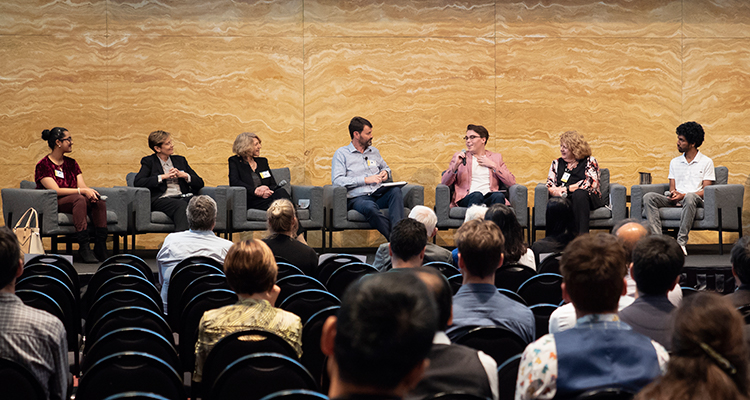
With the theme of ‘Partners in Learning: Connecting Communities’, more than 300 people, including 100 educators, attended our recent 2018 Learning and Teaching Forum.
With all faculties represented at the event, the presentations delved into how we can empower students in their education and focused on three streams: (1) Being courageous (2) Being employable and (3) Being inclusive.
“Staff and students courageously questioned why we do things in a particular way; discussing how we can be more inclusive and can enhance our students’ career and employment outcomes,” said Pro Vice-Chancellor (Education) Professor Geoffrey Crisp. “Including the student voice as an equal partner in our learning enhancement activities is an important part of our educational philosophy here at UNSW.”
- Being courageous
Whether it’s flipping classrooms, introducing virtual reality (VR) or utilising Facebook to create more active learning environments, the courageous efforts of educators to create more enticing ways to learn were presented at the Forum. But does student feedback suggest they receive benefits from these changes?
For example, Dr Jayashri Ravishankar, from the School of Electrical Engineering and Telecommunications, introduced team-based activities using an adaptation of the ‘jigsaw’ strategy.
“The students develop their own understanding through active participation. Students then disseminate this information to other groups through different rotations, with 96% of students indicating that this strategy has pushed them to research further and exchange helpful ideas with other students,” said Dr Ravishankar.
One of Dr Ravishankar’s students explained the benefits of this approach: “It’s not just a lecturer telling you something, but you are learning something by yourself. You watch the videos or attend the VR sessions or some of the group activities. I feel like I have learnt better than just listening to the lecturer just telling me something.”
- Being employable
Several presentations featured examples of how career development can be integrated into a course, such as professional skills attainment, micro-credentialing and opportunities through industry internships.
Buddhi Ranasinghe, Vice-President of the Chemical Engineering Undergraduate Student Society, explained how the Society has rolled out an Industrial Training Program. “We went from hosting absolutely no industry events to hosting events which attracted 50-60 professionals to campus. These events motivate students to become a part of our society,” he said.
His presentation also revealed that even before these industry events gained momentum, students were being empowered to take ownership of their career. Through modules in Moodle, students can work on their general employability skills such as resume writing, interview techniques, networking and personal branding.
Notwithstanding language or cultural norms as a barrier, catering to the needs of diverse learners is integral to ensuring inclusivity in curriculum design. Presenters explored different approaches to the development of their curricula.
For example, Camille Lapierre, a French international student who first came to Australia in 2014 as an exchange student and then again in 2016 to start her Masters of Interpreting, participated in the Personalised English Language Enhancement (PELE) course. The course, part of the School of Humanities and Languages, provides an opportunity for students to assess their individual language ability and needs by analysing their personal strengths and weaknesses. The course doesn’t offer a one-size-fits-all solution as the diversity of language needs is as diverse as the learners themselves.
“We need to be more inclusive in the way we address English skills, for both domestic and international students. We need a more personalised and autonomous method to address our own goals,” said Camille.
The highly personalised learning environments of the PELE approach meant that students felt more confident self-reflecting and guiding their individual learning experience. Further evidence suggests that the students’ sense of belonging to the PELE community showed a significant correlation to their sense of belonging to their faculty and UNSW community. This feeling of empowerment, self-efficacy and the implicit impact that programs such as PELE have had on the student experience has provided opportunities for lifelong learning. It has given students different methods to feel included through curriculum.
Missed out on a session or want to find out more?
All presentation slides and recordings from the 2018 UNSW Learning and Teaching Forum are now available on the UNSW Learning and Teaching Forum Moodle Course site (self-enrolment key: lntforum). Additionally, resources from the Pre-Forum Workshops are also available on this course site.
If you’d like to keep on top of education news at UNSW, subscribe to our PVC(E) eBulletin here.
- Log in to post comments
